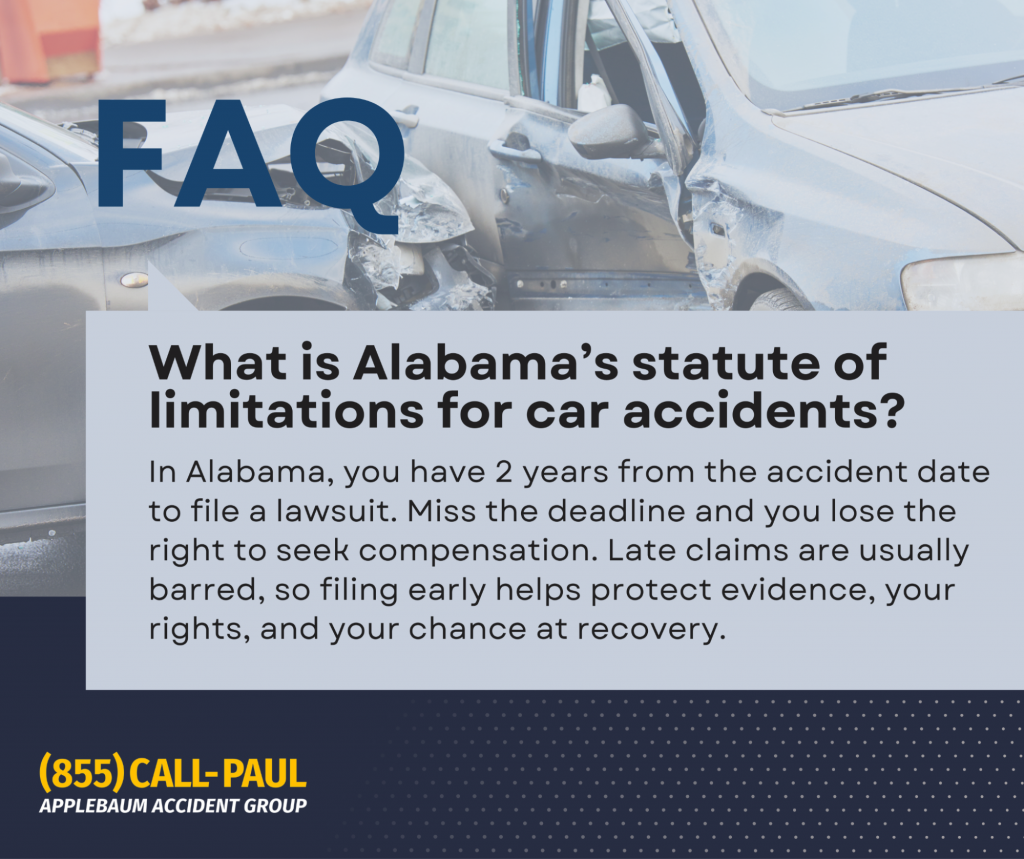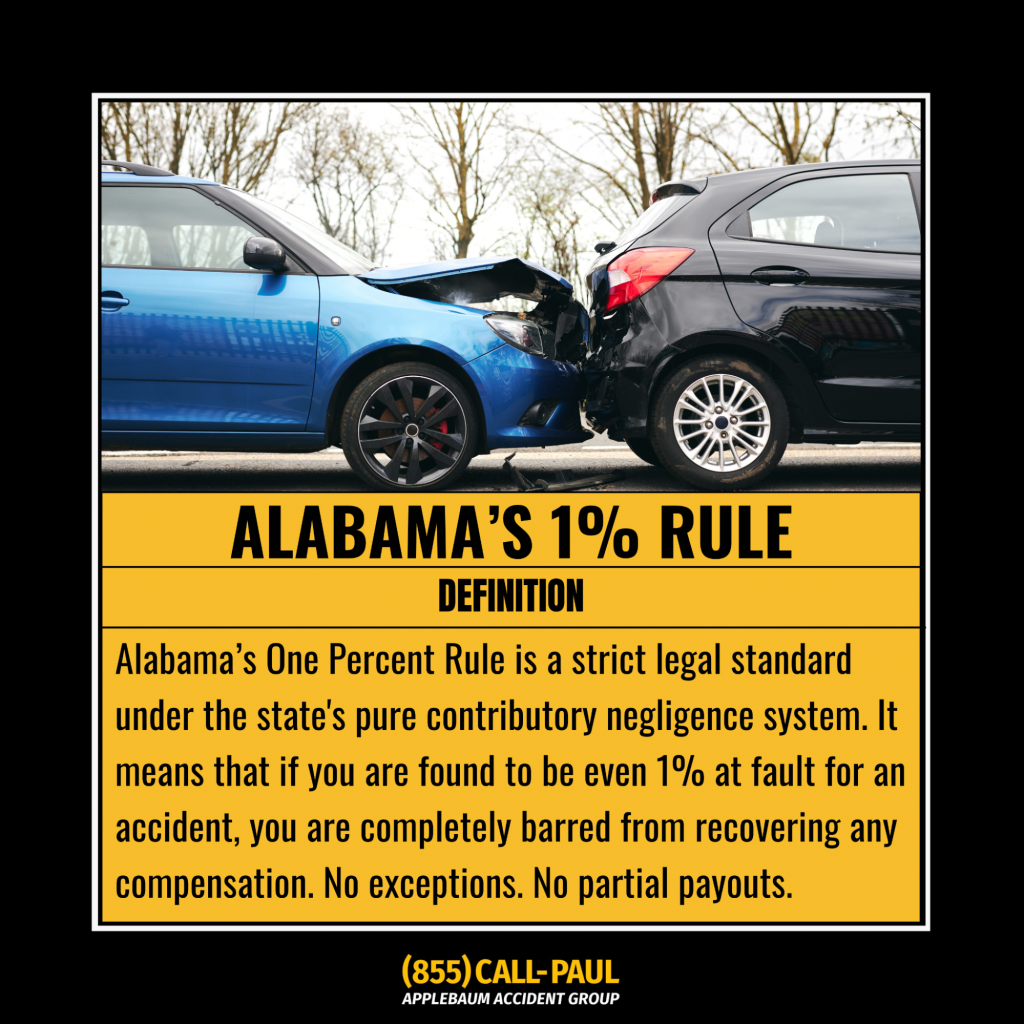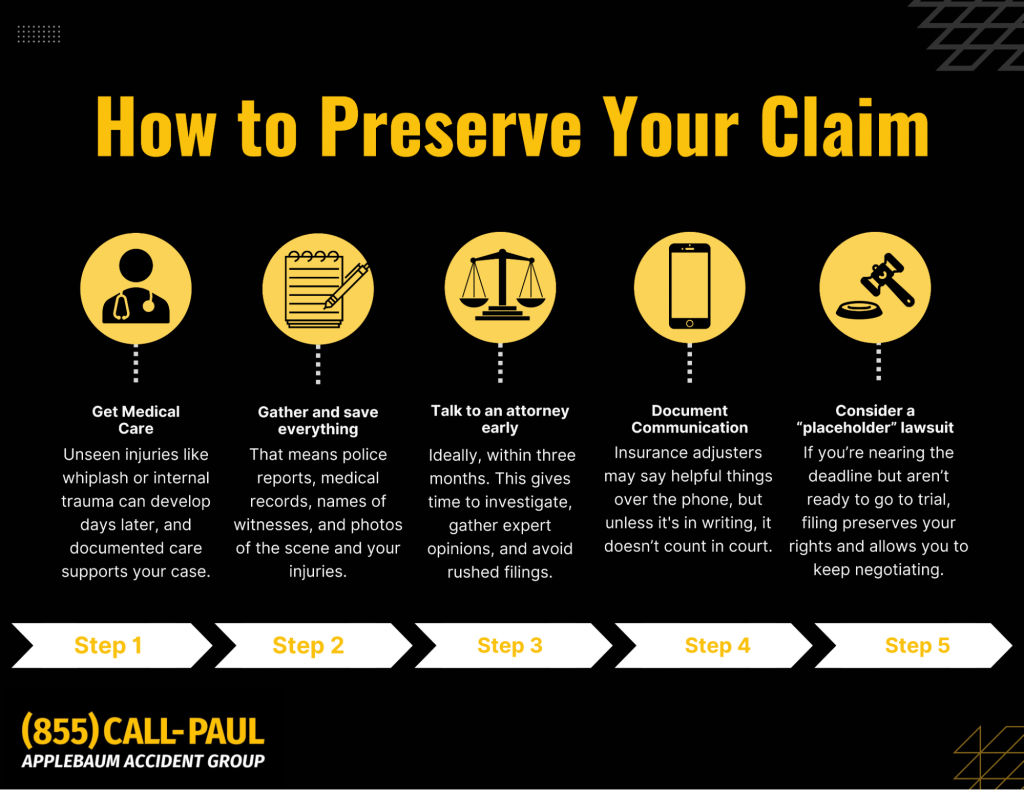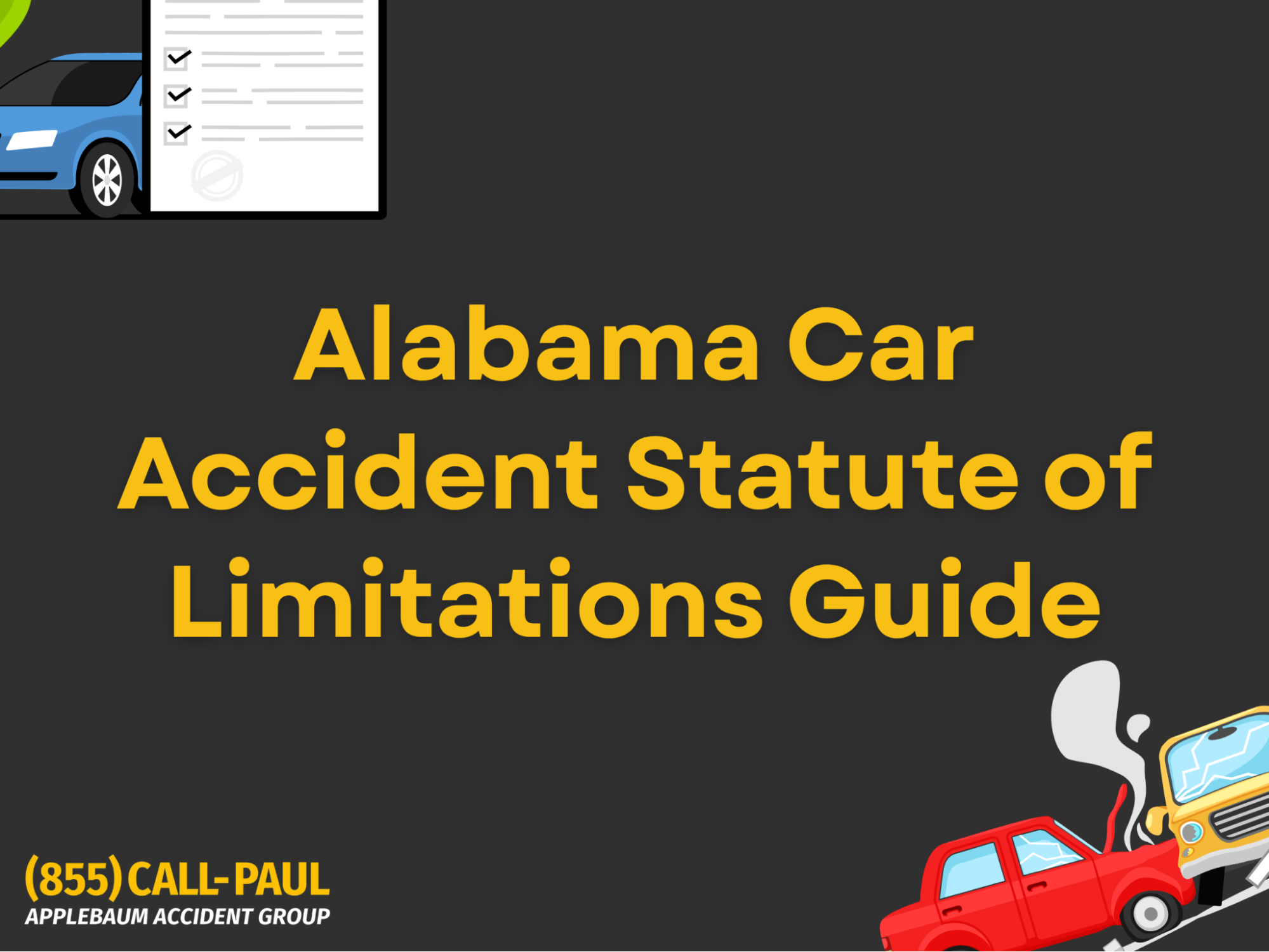In Alabama, you have 2 years from the accident date to file a lawsuit. Miss the deadline and you lose the right to seek compensation. Late claims are usually barred, so filing early helps protect evidence, your rights, and your chance at recovery.

But timing isn’t the only factor you need to consider. There are exceptions, hidden risks, and insurance tactics that could leave you unprotected if you aren’t careful.
Whether you’re trying to understand when the clock starts, what to do if you’re a minor, or how to preserve your rights if an adjuster keeps stalling, this article breaks it all down.
And if you’re feeling overwhelmed or unsure who to turn to, Applebaum Accident Group is here to help. We’re not a law firm, we connect injured drivers with trusted, results-driven attorneys who don’t play games with your future.
Know This First: You Only Have 2 Years to File a Claim
The legal countdown starts immediately.
- Alabama Code § 6-2-38 gives you exactly 2 years from the date of the accident to file a personal injury lawsuit.
- There is no grace period. Day 731 is already too late.
- If your injuries weren’t immediately apparent, Alabama’s discovery rule may allow the timeline to start when the injury is discovered, or reasonably should have been.
- Minors or those with legal disabilities are granted exceptions. The two-year window doesn’t begin until they turn 19 or are no longer under a legal disability.
Still in treatment after two years?
This is one of the most common fears. Here’s the answer: You can still file while receiving care. The law doesn’t require your treatment to be finished, only that your case is filed in court before the deadline.
Why Filing Late Could Cost You Everything
There’s no leeway when it comes to Alabama’s statute of limitations. If the two-year window closes, so does your ability to take legal action. Courts don’t make exceptions for ongoing medical treatment, unfinished negotiations, or unreturned calls from adjusters.
Here’s what often surprises people:
- After two years, your claim is barred. Even being one day late can wipe out your right to compensation.
- Insurance adjusters have no legal duty to remind you of the deadline. If they go silent, delay paperwork, or ask for more information, that doesn’t stop the legal clock.
- Only written tolling agreements matter. If your insurer agrees to pause the deadline, that must be in writing. Anything verbal or implied won’t hold up in court.
If you’ve been waiting for the “right time” to file, or hoping to avoid court by cooperating with the insurer, know this: the longer you wait, the more you risk losing everything.
Key Exceptions to Alabama’s Deadline (and How They Work)
While the two-year limit applies to most car accident cases, there are several scenarios that shift or pause the timeline. Understanding these exceptions can make or break your case:
- Legal disability (minor or incapacitated): If the injured person is under 19 or mentally incapacitated, the statute of limitations doesn’t begin until they’re legally able to sue. For minors, that usually means age 19.
- Defendant out of state: If the person responsible for the accident leaves Alabama before a lawsuit is filed, their absence doesn’t count toward the two-year window. Time resumes when they return.
- Delayed injury discovery: Some injuries, like concussions or internal damage, don’t show up right away. In rare cases, the deadline starts when the injury is discovered, not on the accident date.
- Wrongful death claims: These have a separate two-year timeline, which starts on the date of death, not the date of the crash that caused it.
These exceptions are narrow and must be proven. Don’t assume you qualify, talk to a professional early.
What If You’re Suing a Government Entity?
Suing a city or county in Alabama? The process gets even stricter.
- For cities, you must file a formal notice of claim within six months of the incident.
- For counties, that deadline is extended slightly, to one year.
Miss either one, and your case is over before it starts. These government timelines override the standard two-year statute. If the accident involved a city bus, county vehicle, or poorly maintained public road, take action fast.
Does Alabama Follow No-Fault Rules?

No. Alabama is a fault-based state. That means:
- You can only recover damages if you can prove the other party was entirely at fault.
- If you share even 1% of the blame, Alabama’s pure contributory negligence rule bars you from any recovery.
This harsh rule shocks many accident victims. One moment of inattention, one missed signal, and your claim could be denied in full.
That’s why skilled legal help matters. Determining fault isn’t always black and white, and experienced attorneys know how to build strong cases that shift liability to where it belongs.
How to Preserve Your Claim Before It’s Too Late

The biggest mistake accident victims make? Waiting.
Here’s how to protect your rights before the clock runs out:
- Get medical attention immediately. Even if you feel “fine,” unseen injuries like whiplash or internal trauma can develop days later, and documented care supports your case.
- Gather and save everything. That means police reports, medical records, names of witnesses, and photos of the scene and your injuries.
- Talk to an attorney early. Ideally, within three months. This gives time to investigate, gather expert opinions, and avoid rushed filings.
- Put every communication in writing. Insurance adjusters may say helpful things over the phone, but unless it’s in writing, it doesn’t count in court.
- Consider a “placeholder” lawsuit. If you’re nearing the deadline but aren’t ready to go to trial, filing preserves your rights and allows you to keep negotiating.
Waiting for a better offer or assuming the insurer “will do the right thing” is a gamble you can’t afford.
What Happens After You File?
Filing a lawsuit is often just the beginning of the negotiation phase, but with your rights protected.
- Filing preserves your rights. Once the suit is filed, the statute of limitations can’t cut you off.
- Even one day late is fatal. Courts are not flexible. A late claim means zero compensation, even if liability is clear.
- You can still settle after filing. Many cases settle before trial, but only if you’ve kept the door open by filing in time.
The key takeaway: filing just keeps your legal options alive.
Worries That Are Totally Valid (and How to Avoid Them)
How long does a car accident stay on your record in Alabama?
Answer: Insurance companies typically consider crashes for 3–5 years. More severe offenses, like DUI-related crashes, may stay for 5 years or longer.
Can I still file if I’ve been talking to an adjuster for months?
Answer: Not unless you file in court. Ongoing conversations with the insurer don’t extend the deadline unless they’ve agreed in writing to toll it.
Can I sue both the driver and the vehicle owner?
Answer: Yes. If the driver wasn’t the owner, or if multiple parties are at fault, name them all. Leaving someone out may limit your compensation options.
My lawyer filed on the very last day, is that normal?”
Answer: It’s not unusual, but it’s not ideal either. Filing early gives your legal team more flexibility and reduces stress.
What if I don’t know the at-fault driver’s insurance limit?”
Answer: You’re allowed to ask. In many cases, insurers will provide this info, especially if serious injuries are involved. An attorney can help request it officially.
Our Advice: Don’t Wait, Your Future Depends on Timing
When it comes to Alabama’s statute of limitations for car accidents, time isn’t just ticking, it’s closing doors. Whether you’re still recovering, still negotiating, or still trying to figure out your next step, the law doesn’t wait for you to feel ready.
- Talk to a qualified attorney as soon as possible.
- Delaying, even for good reasons, can make a winnable case disappear.
- Always put your communication with insurers in writing.
- Don’t assume anything is being handled unless you see it filed in court.
Your case is only as strong as your timing. Act early, and you give yourself the best chance at securing compensation and moving forward.
Don’t Risk Everything on a Deadline, Get Help That’s Built for You

If you’re even thinking about whether the statute of limitations could affect your case, the clock is already ticking, and your next move matters.
At Applebaum Accident Group, we connect people just like you with the right attorney for your case, not just whoever picks up the phone. If an adjuster is stalling, if you’re unsure about how much time you have left, or if you’ve been denied by one law firm already, you still have options.
Here’s how we help:
- Fast, direct attorney referrals based on your accident type, injuries, and legal timeline.
- Support navigating the legal maze, especially when you’re dealing with insurance delays or vague responses.
- Protection from losing your rights, our network attorneys know how to file when it counts and negotiate when it matters.
👉Contact Applebaum Accident Group today and we’ll connect you with a legal team that understands the urgency, the law, and most importantly, you.





